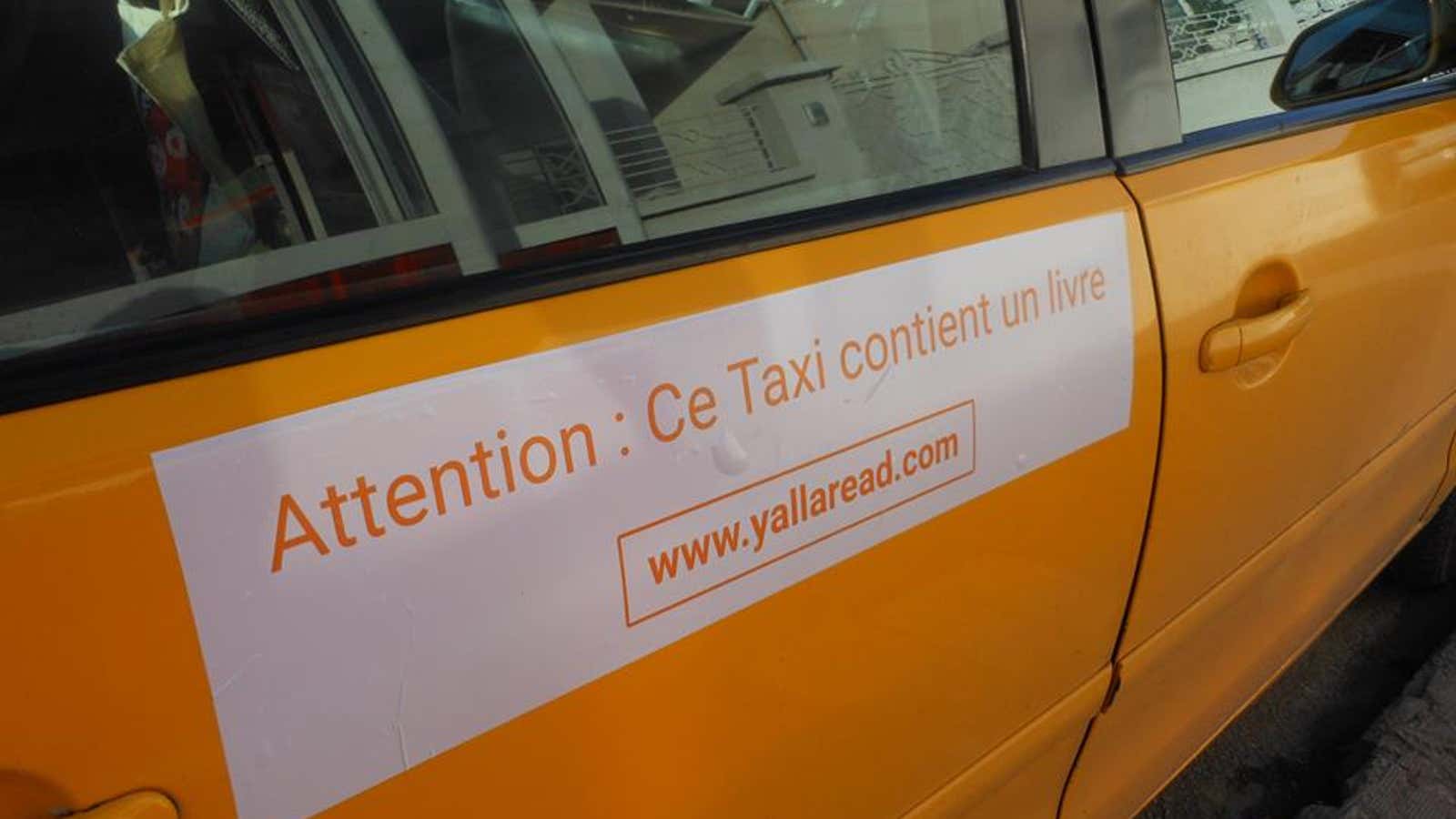Most of the yellow cabs racing through Tunis are decorated with air fresheners, glittery pendulums, and framed baby pictures. Sometimes you’ll find a complimentary box of tissues. But taxi driver Ahmed Mzoughi, 49, has taken a more cerebral approach to his vehicle’s decor. Scattered on the seats and lining the dashboard are slim volumes of poetry, fat novels, and psychology books. Stuck on a side door is a decal that says, “Attention: This Taxi Contains a Book.”
That’s the tagline for a literary initiative launched in October by online book-sharing platform YallaRead (“Come on, Read” in Arabic). In collaboration with E-Taxi, an Uber-style cab-hailing service, YallaRead has put books in a select number of cabs like Mzoughi’s, giving passengers the chance to skim a few pages of Paulo Coelho or Naguib Mahfouz from the comfort of the backseat. Traffic jams are common enough in Tunis that you can read at least the first few paragraphs of a book in one trip, while a journey across the city lends itself to a full chapter. Before disembarking, passengers are encouraged by advertisements, or even their driver, to visit YallaRead’s website, find the book, and continue the story.
Arabic literature and poetry have a rich and varied history, dating back 16 centuries. Such is the cultural import of Arabic letters that the language’s word for literature, adab, is derived from the same root as etiquette, and used to signify personal enrichment. Scholars point to the Islamic Golden Age (8th-13th century) as the great period of Arabic poetry and prose, and a resurgence of Arabic literature in the early 20th century brought us literary greats like Kahlil Gibran, the world’s third best-selling poet.
Yet despite this rich literary history, actual, sustained readership in Tunisia is low, according to Emrhod Consulting, a North African research institute that has done polling on readership. It’s not necessarily a question of literacy: More than 80% of the adult population is literate, and many Tunisians are fluent in both Arabic and French. But 75% of households have no literary material aside from the Qur’an or newspapers, and only 18% of Tunisians bought a book in the past year.
The ministry of education says it’s uncertain as to why Tunisians are reading so little, though spokeswoman Zoubeida Selah acknowledged that it’s a problem they are trying to address by building more libraries. Tunisia is already home to the biggest library in North Africa (link in French).
YallaRead’s 24-year-old cofounder, Ahmed Hadhri, thinks Tunisians are abandoning books in favor of time online, a cheaper option. “Books in Tunisia are expensive and unavailable,” he says. “There isn’t Amazon, and we don’t find a lot of books in bookshops—people are obliged to ask their friends abroad to make purchases.” A weakened Tunisian dinar has also made overseas book buying prohibitively expensive.
Hadhri launched YallaRead last spring; the platform lets readers post the contents of their personal libraries online and meet up with other bookworms. It follows in the footsteps of programs like Australia’s Books on Rails, which has left 300 books on trains, buses, and trams in Melbourne. Last year, book-wielding commuters in one Romanian city were given a free bus ride.
More than 16,000 cabs serve greater Tunis’ 2.5 million residents, according to the ministry of transport. YallaRead has placed books in Arabic, French, and English; ranging from poetry to self-help; in five taxis so far. The only rule is no religious books, Hadhri says. YallaRead is actively seeking funding and book donations so they can expand to all cabs in Tunis.
“Most Tunisians have abandoned reading,” Mzoughi says, but YallaRead’s program at least “encourages everyone to open up a book, to read a few words or sentences.” The initiative is still in its infancy, but it’s already reached more than 500,000 people on social media. Some clients have called E-Taxi specifically to request a YallaRead cab, Hadhri says.
A selfie in a taxi with a glossy book cover? Now that’s guaranteed to get likes in Tunis.
